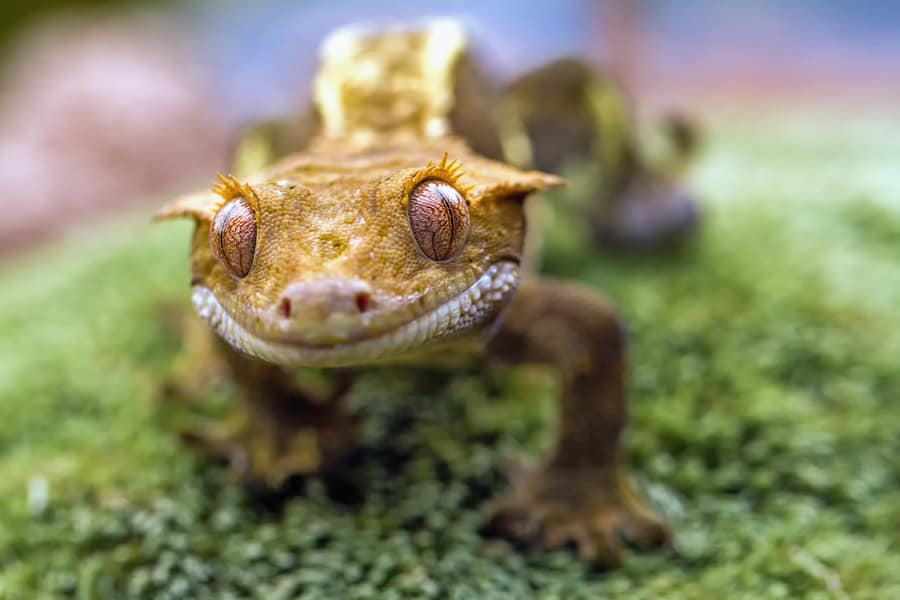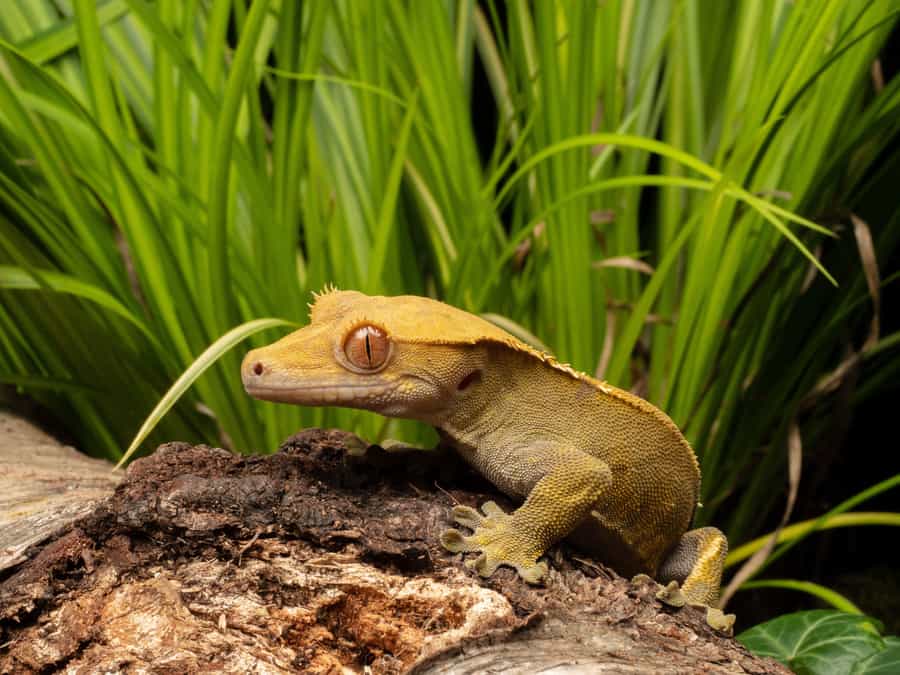As omnivores that enjoy both insects and fruits, crested geckos have a unique, varied diet that requires quite a bit of planning. Because they need both sweet and fatty foods, they can easily get too much of these fattening nutrients, which can cause them to become overweight.
Crested geckos are vulnerable to being overfed especially if fed more fruit items than should be allowed on a daily basis. An abundance of insects can also lead to overfed crested geckos since they are unable to stop feeding once satiated.
Fortunately, having a clear meal strategy and monitoring the gecko’s eating habits can curb a lot of these issues. On rare occasions, consistent and unexplained weight gain may be a medical issue that requires veterinary care, but weight gain is typically an issue that can be solved at home.

Can You Overfeed Crested Geckos?
Because they have a complex diet that can easily become misbalanced, overfeeding crested geckos can be surprisingly easy. The owner should research in-depth about the crested gecko’s diet proportions, as many foods that are considered a typical lizard’s main nutrition source can prove to be highly fattening to crested geckos.
To learn his crested geckos like being held, please check out this helpful article I wrote. To learn which items are bad for crested geckos, please check out this helpful article I wrote.
How can I help my gecko lose weight?
Oftentimes, one of the biggest side issues that come with overfeeding is unnecessary weight gain. The following are some steps the owner can take to help the gecko lose weight and avoid overfeeding, which will be discussed in more detail throughout the article.
Step 1: Cut back on insects and give more MRP instead.
Especially regarding fatty worms, insects contain too much fat and protein content, which will definitely increase weight. Meal Replacement Powder (MRP) is a good substitute for too many insects, as it is designed to give the crested gecko balanced nutrients without contributing too much to fat content.
Step 2: Try cutting back on fruit a little.
As reptiles that crave sweet foods, crested geckos can easily overindulge in the fruit department, which can cause surprising weight gain. Because of this, the owner should limit the fruit to the recommended amount and possibly less if the gecko is continuing to retain or gain weight. Again, the owner should replace the fruit not given with MRP.
Step 3: Check the terrarium and environment.
Sometimes, the gecko will have a balanced diet but an overly small enclosure, which discourages exercise and sometimes causes lethargy. While the owner can get away with a tank as small as 20 gallons, they may want to invest in a 30-gallon or even 40-gallon terrarium if they feel the gecko needs more room.
Step 4: Take the gecko to a vet.
If the crested gecko is still maintaining or gaining weight, it may be struggling with a health problem that you can’t cure on your own. If that is the case, you should bring your gecko to the vet immediately. Especially if the weight gain happened suddenly and/or for no apparent reason, or if the gecko’s weight gain is accompanied by other symptoms, the owner should call a local vet who specializes in reptiles.
How Much Food Do Crested Geckos Need?
Before we can know how to cut back on fattening foods, we need to take a look at the average crested gecko’s diet.
Typically, a crested gecko needs to eat three times a week. However, if it is a juvenile or baby, it needs to be fed daily to accommodate growth. The crested gecko’s main food source should be meal replacement powder (MRP), which should be fed during any meals where the crested gecko is not eating any insects or fruit.
Speaking of insects, a crested gecko should have crickets once to twice a week depending on its needs. For every meal with them, the crested gecko only needs about two crickets. Since worms have high fatty content and fruits have quite a bit of sugar, the crested gecko’s owner should only feed it these items in separate meals about once to twice a month.
For a complete breakdown of feeding box turtles, please check out this helpful article I wrote.
Signs of an Overfed Crested Gecko
Like people, different geckos have different metabolisms. Because of this, even the standard diet previously mentioned may make a crested gecko overweight, so the owner should learn to spot the warning signs.
Some of the more common traits of an overfed gecko are chubby legs and fat rolls throughout the body, especially around the belly area. Overall, an overweight crested gecko will have a very pudgy appearance. Also, if it has a weight that is significantly over 40 grams (50 or above, although this may vary depending on body structure), it is likely overweight.
Other than appearance, a good way to know whether you are overfeeding your crested gecko is to check for leftovers. Crested geckos love the sweet taste of fruit, so this may not be a good measure, but if they are consistently leaving MRP and crickets, that may either be a sign of overfeeding or a poor appetite for other reasons.
At the same time, a healthy crested gecko may leave leftovers occasionally even when fed the correct diet, which is totally fine.
Is Overfeeding Crested Geckos Bad?
Although a pudgy crested gecko may appear adorable, overfeeding it and allowing it to gain too much weight can cause serious issues. For instance, if they become too overweight, they may face complications and get sick. Also, they will struggle to exercise and possibly become lethargic.
Overweight crested geckos will likely have issues with their reproductive systems, which poses an issue if the owner is trying to breed them. Even if they are not intending to breed, the fact that it is destroying their bodies should encourage the owner to stop overfeeding.
Along with weight gain issues, overfeeding can actually cause stress. When the owner feeds the crested gecko too much live food (especially crickets), the leftover insects may bite the crested gecko, which can inflict surprisingly serious injuries. Because of this, the owner should take out any leftover crickets once they are sure the gecko is done eating.
Even if the owner is simply giving the crested gecko too much fruit or MRP as opposed to insects, any food that the crested gecko does not eat can become clutter. If the owner does not clean up soon after the meals, the fruit can quickly go bad, causing the gecko more stress.
The owner may clean up, but even then, giving the crested gecko too much food and then having to dispose of it can be very costly in the long run.
Are Crested Geckos Able to Stop Eating Once full?
Technically, crested geckos can stop eating once they are full because they can tell when they have eaten enough. However, they may decide to ignore their bodies’ cues and overfeed themselves out of a desire for food, especially if the food is sweet or they haven’t eaten for a while. Because of this, the owner should stay within recommended daily limits.
If the gecko hasn’t eaten for an extended period of time, a little extra food is fine, but the owner should also ensure that the gecko is not eating too quickly, or it may not realize when it is full. The owner can do this by introducing a little bit of food at a time.

What should I do if Crested Gecko is still hungry?
Sometimes, the owner may find that the crested gecko still appears hungry after they have fed it the required daily amount. If the crested gecko has only done this one time or occasionally, wait until the gecko’s next feeding. However, if the gecko is consistently appearing hungry afterward (especially if it is losing weight), this may indicate that you should feed the gecko more to accommodate its metabolism and specific needs.
Generally speaking, a crested gecko still appears hungry because it is craving (as opposed to truly hungry for) food, especially regarding sweet fruits. Especially if it has not eaten for a while, it may be hungry because it has eaten too quickly. The crested gecko may also be feeling hungry because you are putting it on a weight loss plan, which is different from what the gecko is used to.
Even if the crested gecko is genuinely hungry, it will be fine as long as you feed it the recommended amount or amount found to suit its metabolism. As long as it is not losing an excessive amount of weight and does not appear sick, the gecko can wait until the next meal.
For a complete breakdown of the health impacts of crested geckos shedding their tails, check out this article.
Can Fat Crested Dragons Be a Sign of Something Other Than Overfeeding?
Although being overweight is usually from overfeeding, it can also be an indication that the crested gecko has an illness. For instance, the crested gecko may have a tumor, slow metabolism, disease, or even infection that is causing puffiness.
Especially since weight gain from illness is a more complex issue that an expert should evaluate, the owner will need to look for an exotic vet who specializes in or is at least knowledgeable of reptiles.
Also, the crested gecko may be gaining weight due to a lack of exercise. To encourage the gecko to climb, play, and move around, the owner should start by trying to add items of interest, such as paper towel rolls and other safe décor. However, the owner should avoid completely rearranging the cage, as this can cause stress.
If the gecko appears lethargic, the owner may need to check temperature and lighting. If the gecko is too cold, it will not want to move. Also, cool temperatures will also slow digestion, allowing food to stay in their stomach for longer.
If this is the case, the owner should warm up the cage immediately, as the food can rot in the stomach and cause serious problems. Finally, if the gecko does not have a regular night and day schedule, its sleep cycle will be ruined, encouraging lethargy.
The gecko may still be gaining or retaining weight while remaining inactive. At this stage, the owner should consider getting the crested gecko a larger cage. As mentioned before however, weight gain can be a sign of illness, and prolonged lethargy is another commonly associated symptom.
Dealing with Weight Loss
On the other side of the spectrum, the owner may be dealing with a crested gecko that is struggling to gain weight. One good way to tell whether the crested gecko is underweight is to check the calcium sacks in the back of its mouth. If they are unusually small or nonexistent, this indicates that the gecko is too thin.
Also, if the ribs and hips are visible (the ribs may be partially visible on a baby or juvenile, which is fine), the crested gecko needs to gain weight.
Some common causes for weight loss include stress, low humidity, an overly large terrarium that makes it challenging to find food, overly cool or warm temperatures, and poor diet. To ensure the crested gecko’s health, the owner should check that the crested gecko’s terrarium and environment are suitable.
In the meantime, the owner may try feeding the gecko by hand or with a syringe. However, they should also be careful to not do this too much, as the gecko may start wanting the owner to hand-feed it all the time.
As previously mentioned, crested geckos love sweet foods such as fruit, so giving the gecko extra fruit (possibly in the form of puree depending on its strength and energy levels) can increase appetite.
Conclusion
Although overfeeding a crested gecko to the point of it gaining weight is a valid concern, the issue can usually be curbed. For instance, the owner should be sure that the crested gecko eats mainly MRP as opposed to fatty insects and sweet fruits.
Also, the owner should check that the gecko’s enclosure is suitable and keep strictly within the feeding amount needed for the gecko’s metabolism. Even if the gecko gains weight, knowing the signs of an overweight crested gecko and taking steps to help it slim down will ensure the lizard’s health and wellbeing.
For a complete guide to how to prevent overfeeding box turtles, please check out this helpful guide.
